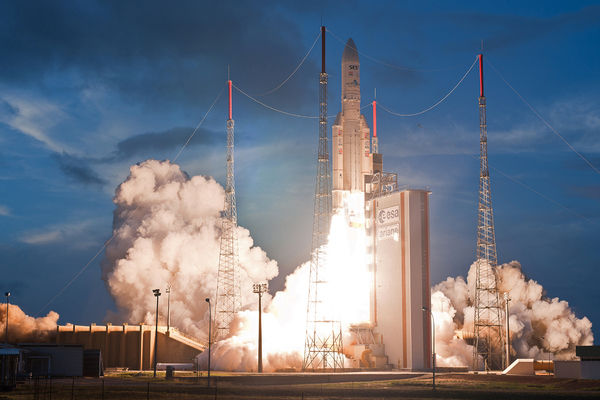Paris. July 31. INTERFAX-The Ariane 5 heavy launch vehicle has successfully placed the European Eutelsat Quantum satellite and the Brazilian Star One D2 satellite into a geostationary transition orbit, the French operator Arianespace reported.
"The withdrawal of satellites has been confirmed," the company said.
The launch was carried out from the Kourou cosmodrome in French Guiana on Friday at 23:00 Paris time (on Saturday at 00:00 Moscow time).
After about 36.5 minutes, having separated from the second stage of the rocket, the two spacecraft were put into orbit.
Eutelsat Quantum is the world's first reprogrammable commercial satellite. Its versatility brings the functionality of communication satellites to a qualitatively new level, which will now be able to adapt to the tasks of operators with the help of software control, when it is required.
Its receiving antenna operates electronically controlled in the Ku band with eight independent reconfigurable beams. This allows the operator to reconfigure radio frequency beams in the coverage area, providing unprecedented flexibility in the operation of multimedia and broadcasting services. The scheme is applicable both to each specific beam and to several at the same time, and includes up to several dozen pre-programmed configurations of each beam.
The antenna can also reduce possible interference - intentional or accidental-due to its ability to determine their geolocation.
The innovative technology complements the line of fully digital payloads of the new generation, providing a high level of customization and flexibility. The satellite has an unprecedented level of reprogramming of the coverage, frequency and power of the device in orbit and allows for a complete reconfiguration of the parameters, including the position of the device in orbit.
The 3.5-ton satellite was developed jointly by the European Space Agency, the operator Eutelsat and the company Airbus Defense and Space. The estimated life of its operation is 15 years.
The Star One D2 spacecraft was created by the American company Maxar for the Brazilian operator Embratel. It will expand access to broadband Internet and telecommunications services in several areas of Central and South America.
The satellites will be placed in a geostationary orbit with an apogee of 35.7 thousand km and a perigee of 250 km.
The total weight of the payload, which was put into orbit by the Ariane 5 heavy launch vehicle, reaches more than 10.5 tons.

